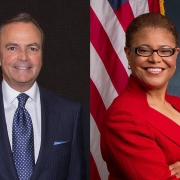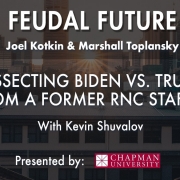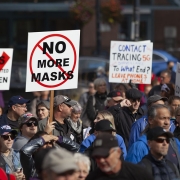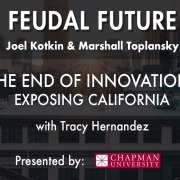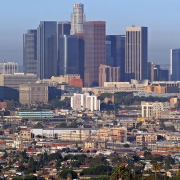Who Will Be the Next Mayor of Los Angeles?
Central Avenue, the historic heart of South Los Angeles, has seen better days. Once the home to leading black institutions, like the famous Dunbar Hotel, where jazz and other musical greats stayed, it was also an industrial powerhouse that promised decent work for those fleeing the Jim Crow South. But today many, if not most, of its factories are closed; many icons of the old black business community have disappeared, too. The area, site of two of the most devastating riots in American history, is now poorer in relation to the rest of the city than before those upheavals.
Yet amid a malaise that afflicts much of the city, entrepreneurial energy remains evident. Central Avenue’s sidewalks crowd with the brightly colored booths of street vendors, selling a broad range of food, clothes, and other products—more like Mexico City or Mumbai than the South L.A. of the past. Some new apartments are rising to replace the decrepit ones, and the street-level liveliness seems more Washington Heights than car-centric Los Angeles. Despite its troubles, Central Avenue does not exhibit the deathly sense of abandonment of places like the South Side of Chicago or other inner-city communities, where the spirit of enterprise has all but disappeared.
“We still have potential,” insists 63-year-old Rick Caruso, a billionaire running what once seemed a quixotic campaign for mayor. On June 7, Caruso will be a candidate in the city’s open mayoral primary, facing off against, among others, the race’s early frontrunner, long-time congresswoman Karen Bass. (The top two finishers will meet in a run-off general election in November if no candidate wins a majority of the vote.) Without any press, but for me, Caruso spent a recent morning at the Beehive, a new Southside business incubator located amid the detritus of the city’s industrial past. The youthful activity of the startups seemed to energize him. “I want to get on the phone and get investors to come back here—but they won’t if they see instability, the homeless camps, and the crime. That has to change.”
Though he has discarded his designer suit, Caruso cannot help but appear natty with his coiffed hair and monogrammed white shirt. The grandson of Italian immigrants, and son of an entrepreneur who founded Dollar Rent a Car, he started his real estate business here in 1987 and made a fortune worth more than $4 billion by developing shopping complexes, most notably the Grove, adjacent to the iconic Farmer’s Market. A key Caruso theme is restoring the promise that made L.A. the premier urban growth center of the last century, during which the city’s population grew from barely 100,000 in 1900 to nearly 4 million. Now, Los Angeles’s population is in decline and its appeal has faded. The city peaked at a population of 3,983,000 in 2019, and fell 134,000 to 3,849,000 by 2021, with a 41,000 loss in the last year.
The Wall Street Journal has described Caruso as a “liberal,” but that’s a stretch. A longtime Republican now conveniently turned Democrat, Caruso is best seen as a pro-business moderate Republican trying to downplay his membership, for example, in the Ronald Reagan Foundation. Yet unlike most GOP candidates here, he also has lots of money. He has spent over $24 million of his own money to reach out to Angelenos. His campaign boasts of his skills in dealing with L.A.’s fractious communities, whether in his business ventures or as a member of the Water and Power board, president of the Police Commission, or chair of the USC trustees. His money and message are clearly making headway. Despite the now strongly progressive tilt of the L.A. electorate, Caruso has managed to rise from single digits in February to parity, and perhaps even a lead, over Bass.
Read the rest of this piece at City Journal.
Joel Kotkin is the author of The Coming of Neo-Feudalism: A Warning to the Global Middle Class. He is the Roger Hobbs Presidential Fellow in Urban Futures at Chapman University and Executive Director for Urban Reform Institute. Learn more at joelkotkin.com and follow him on Twitter @joelkotkin.
Homepage photo: Karen Bass via Flickr in Public Domain and Rick Caruso via Flickr under CC 2.0 License.

